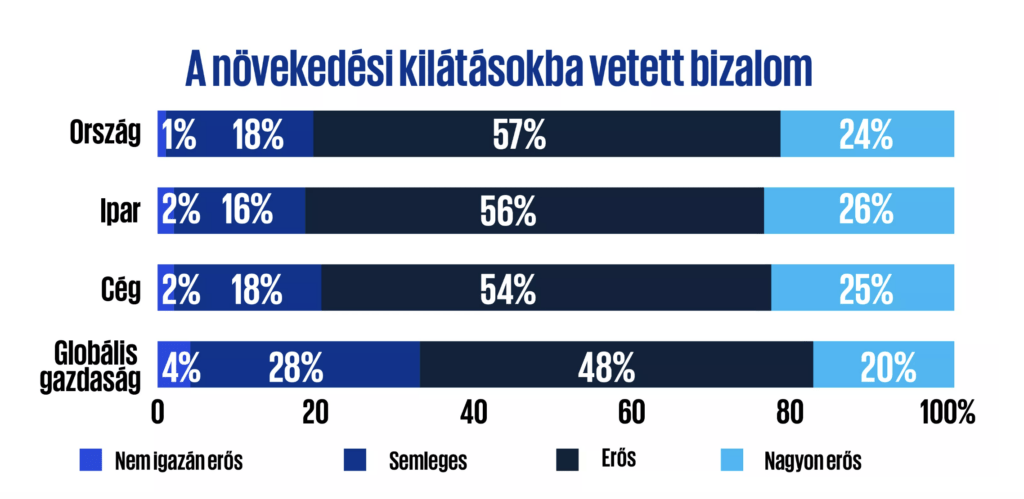KPMG surveyed CEOs again this year: Challenges have increased, leaders are more pessimistic than at this time a year ago
KPMG’s 2025 CEO Outlook research was recently released. For more than 10 years, the survey has been asking the leaders of the largest companies what they think about the global economic situation, their company’s prospects and what they think about the most pressing challenges of the coming period. 1,350 CEOs from 12 industries participated in this year’s survey. The latest results were presented by Rózsai Rezső, CEO of KPMG Hungary, at the Portfolio Budapest Economic Forum.
 Rózsai Rezső presented the data from KPMG’s CEO Outlook at this year’s Economic Forum, which reveals, among other things, that the level of instability has further increased in the past 12 months and the number of challenges has increased, and that irregularity and unexpectedness dominate our new geopolitical reality, for which the international communities were apparently not at all prepared. According to him, risks do not appear in isolation, but act systemically, and therefore require comprehensive responses. The CEO highlighted – one of the main conclusions of this year’s survey is that the ability to navigate uncertainty and its speed will be the key to success, and often even survival, and for this a new level of resilience is essential.
Rózsai Rezső presented the data from KPMG’s CEO Outlook at this year’s Economic Forum, which reveals, among other things, that the level of instability has further increased in the past 12 months and the number of challenges has increased, and that irregularity and unexpectedness dominate our new geopolitical reality, for which the international communities were apparently not at all prepared. According to him, risks do not appear in isolation, but act systemically, and therefore require comprehensive responses. The CEO highlighted – one of the main conclusions of this year’s survey is that the ability to navigate uncertainty and its speed will be the key to success, and often even survival, and for this a new level of resilience is essential.
The survey did not bring any surprises in the sense that CEOs’ confidence in the global economy continued to decline. While 93% of executives were optimistic in the first survey – in 2015 – only 72% last year and only 68% this year view the global economic outlook with confidence.
“Although executives’ confidence in their own companies’ performance remains significantly stronger, they are preparing for disruption and fundamentally see the opportunity for an outbreak in inorganic growth. They are therefore not waiting idly for stability and predictability to return”
– added Rezső Rózsai.

Cyberattacks, the AI readiness of the workforce, the introduction of AI systems and processes, and the introduction of technological infrastructure – these were identified by the survey participants as the biggest challenges ahead. This clearly shows that, despite rising geopolitical uncertainties, the changes caused by artificial intelligence are the ones that most influence the daily thinking and problem map of CEOs.
Regarding artificial intelligence, the research found that AI not only carries risks, but also hides opportunities. Artificial intelligence has now clearly become the focus of investor competition and nearly three-quarters of company leaders treat AI as a strategic priority, and even more plan to devote more than 10% of their investment budget to it in the next 12 months. This clearly shows the extent to which AI has become part of corporate thinking. There are different data on when leaders expect to see a return on their AI investments: although AI investments hold significant potential, there is great uncertainty around the timing of their return – many leaders are surprisingly optimistic, but the data indicates that AI is often treated not in a strategic transformation role, but as a tool that will pay off in the short and medium term.
At the end of Rózsai Rezső’s presentation, she drew attention to two – surprising to many – but positive data: although challenges and uncertainty are increasing, companies are committed to achieving the set climate goals and engaging new workforces.
Based on the data, Rózsai Rezső said that there are of course several factors behind the expansion of the workforce, but one of the most striking motivations is the rise of AI. However, it is important to emphasize that AI is not the only driving force. In addition to technological advancements, leaders clearly see the human element, the right expertise and talent as key to ensuring AI truly delivers on its promise. However, leaders are increasingly concerned about the competition for talent. Nearly three-quarters (70%) believe that the competition for AI-related expertise could actually hold back growth. In relation to ESG guidelines, the CEO highlighted that nearly two-thirds (65%) of respondents already quantify or consider the costs and benefits of sustainability initiatives in individual investment decisions, which points towards conscious, data-driven decision-making.
Related news
KSH: in January, consumer prices exceeded the values of the same month of the previous year by an average of 2.1 percent
🎧 Hallgasd a cikket: Lejátszás Szünet Folytatás Leállítás Nyelv: Auto…
Read more >








